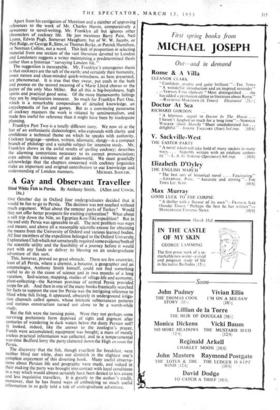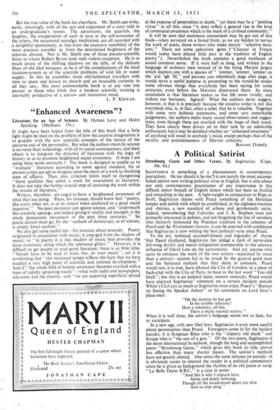A Gay and Observant Traveller
Blind White Fish in Persia. By Anthony Smith. (Allen and Unwin. 16s.) - ONE October day in Oxford four undergraduates decided that it would be fun to go to Persia. The decision was not reached without much argument. What about the remoter parts of Turkey? Would they not offer better prospects for exciting exploration? What about a raft trip down the Nile, an Egyptian Kon-Tiki expedition? But in the end only Persia was agreeable to all. The next problem was ways and means, and above all a reasonable scientific excuse for obtaining the means from the University of Oxford and various learned bodies. All four members of the expedition belonged to the Oxford University. Exploration Club which not unnaturally required someevidenceboth of the scientific utility and the feasibility of a journey before it would part with any funds or deliver its blessing on an undergraduate adventure of this sort.
This, however, proved no great obstacle. There are few countries, least of all Persia, where a chemist, a botanist, a geographer and an entomologist, Anthony Smith himself, could not find something useful to do in the cause of science and in two months of a long vacation. Soil-science, mapping, studies of village-life and economy, plant-collecting—the Kerman province of central Persia provided scope for all. And then in one of the many books frantically searched for facts to support the case for Persia was the intriguing reference to blind white fish living, it appeared, obscurely in underground irriga- tion channels called qanats, whose intricate subterranean patterns and curious construction turned out alone to be a worth-while study.
But the fish were the turning point. Were they not perhaps some surviving prehistoric form deprived of sight and pigment after centuries of wandering in dark waters below the dusty Persian soil? It looked, indeed, like the answer to the zoologist's prayer. Funds were accumulated; equipment was bought; a mass of mostly useless practical information was collected, and in a temperamental war-time Bedford lorry the party clattered down the High en route for Persia.
The discovery that the fish, though excellent for breakfast, were neither blind nor white, does not diminish in the slightest one's complete enjoyment of this diverting book. Many useful observa- tions about Persian life and geography were made, and indeed in their making the party was brought into contact with local conditions in a way which would almost certainly have been denied to less aware and less inquisitive travellers. It is greatly to the author's credit, moreover, that he has found ways of embodying so much useful information in so gaily told a tale of undergraduate adventure. But the true value of the book lies elsewhere. Mr. Smith can write, easily, amusingly, with all the zest and enjoyment .of a story told in an undergraduate's rooms. The adventures, the quarrels, the laughter, the exasperation of each in turn at the self-assurance of the others, the occasional nostalgic meditation, are all recorded with a delightful spontaneity, as free from the excessive sensibility of the more precious traveller as from the determined brightness of the reporter abroad. Nor is Mr. Smith one of those pseudo-scientific bores to whom Robert Byron took such violent exception. He is as much aware of the shifting shadows on the hills, of the delicate blues of old tiled mosques, as he is of the complications of the local taxation-system or of the scientific problems of wild life or water supply. In this he resembles those old-fashioned travellers with time to spare and leisure to absorb and an insatiable curiosity in all they saw. His most commendable book is at any rate one answer to those who think that a modern scientific training is inevitably productive of a narrow and insensitive mind.
L. P. KIRWAN.



































 Previous page
Previous page